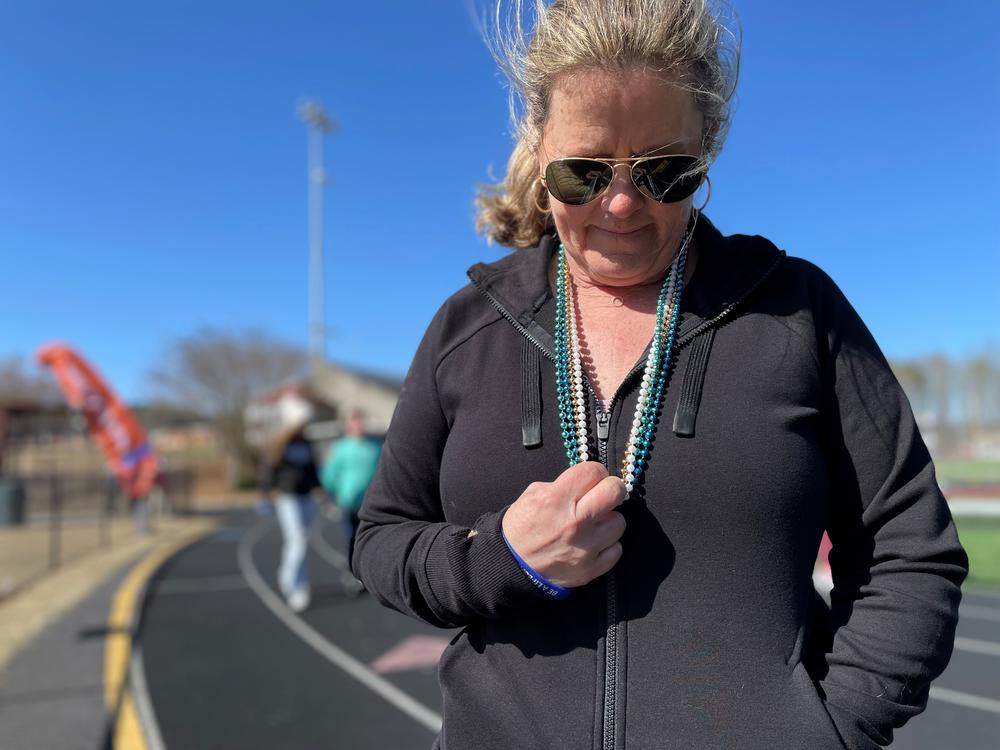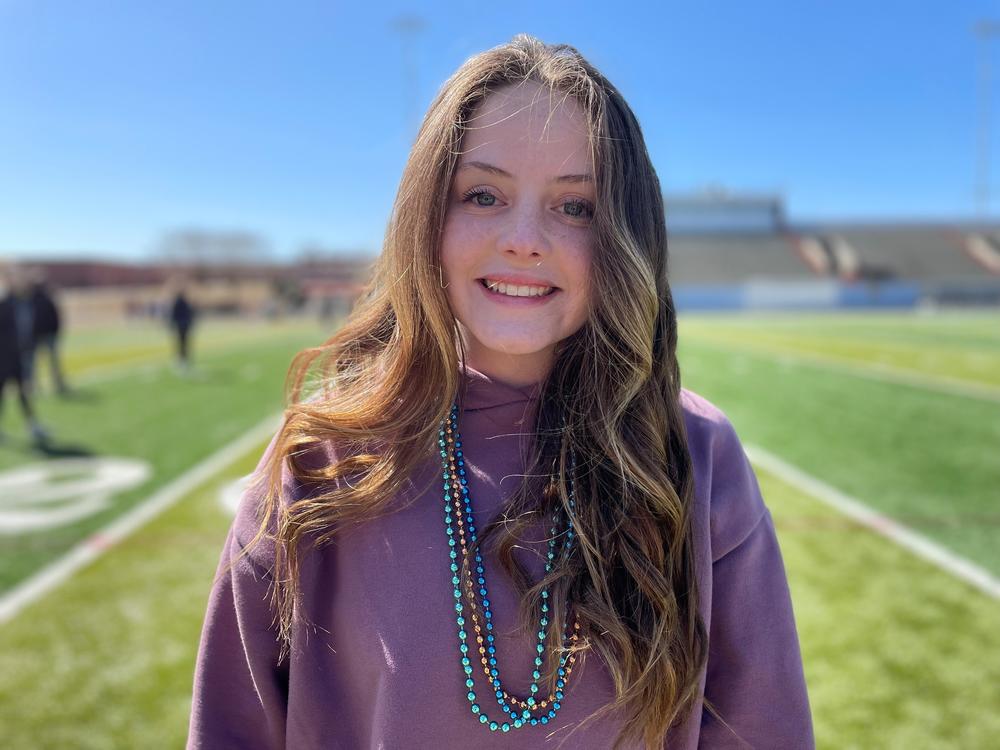
Caption
Mary Norris holds the strands of beads around her neck. Each strand of beads represents a suicide loss, and one for her own struggle.
Credit: Ellen Eldridge / GPB News
|Updated: March 24, 2023 3:13 PM
Suicide rates have been rising for decades among young people. And some worry modern living — and things like social media — tend to isolate kids and make those trends worse. But Georgia schools are taking steps to connect with students and get them talking more freely about feelings around suicide. GPB’s Ellen Eldridge reports.

Mary Norris holds the strands of beads around her neck. Each strand of beads represents a suicide loss, and one for her own struggle.
You don’t get better by refusing to talk about mental health, experts say.
You feel worse. More isolated. More alone.
That’s what made quarantine so tough for some teenagers.
"The worsening crisis in child and adolescent mental health is inextricably tied to the stress brought on by COVID-19," a coalition of the nation's leading experts in pediatric health said, declaring last October that it has become a national emergency.
The pandemic has intensified this crisis, The American Academy of Pediatrics, the Children's Hospital Association and the American Academy of Child and Adolescent Psychiatry wrote.
"Across the country we have witnessed dramatic increases in emergency department visits for all mental health emergencies including suspected suicide attempts," they wrote.
Rates of childhood mental health concerns and suicide rose steadily between 2010 and 2020, and by 2018 suicide was the second leading cause of death for youth ages 10-24.
Beginning in April 2020, the proportion of children’s mental health–related emergency room visits among all pediatric ER visits increased and remained elevated through October, according to the Centers for Disease Control and Prevention. Compared with 2019, the proportion of mental health–related visits for children aged 5–11 and 12–17 years increased approximately 24% and 31%, respectively.
Ali Norris, a Forsyth Central High School senior whose brother died by suicide when she was a freshman, supported friends when a classmate died by suicide in March 2021.
"I went to his celebration of life, and it just hit too close to home, and I realized that I needed to do something," she said. "And I couldn't just sit back and there was something that needed to be done."
The “something” she needed to do was organize a countywide Out of the Darkness Campus Walk, which the American Foundation for Suicide Prevention's Georgia chapter hosts around the state to raise money for suicide prevention. Organizing that took until this March.
Ali walked with her mother, Mary Norris.
As Mary Norris walked, she rubbed a strand of beads around her neck, one strand for each loss.
"I lost my grandfather, my brother and my son to suicide," she said.
She also rubbed one strand to remind her of her own struggle.
"The grief doesn't get less," Mary Norris said. "You just get stronger and find a way to get through the day."
Her brother died almost 40 years ago, back when the phrase "committed suicide" was still accepted.
"It has a negative stigma and connotation," Mary Norris said, contrasting the old phrasing with the newer phrasing, "completed" or "died by" suicide.
"Because, believe me, my son was committed to life, his fiancée, his family and his friend," she said.
She says her generation’s tight-lipped, never-talk-about-it approach to mental health and addiction didn’t help, either.
"My family’s response was just to not say Bill’s name," she said.

Ali Norris stands on the field of Forsyth Central High School during the Out of the Darkness walk for suicide prevention March 26, 2022.
That’s why the Forsyth County School system is finding new ways to listen and to give kids space to talk.
Forsyth County schools have had guidance counselors and social workers for a long time. What’s new, says school system spokesperson Jennifer Caracciolo, are nine student advocacy specialists.
"We like to consider them a super mentor," she said. "So they go in and support the services that counselors, social workers, school psychologists are already providing to the children. It's just an additional layer of support."
The student advocacy specialist program started in 2018, and is funded by local tax dollars, not CARES funding, similar to how the Forsyth County School District funds school counselors and nurses beyond the state minimum.
The nine advocates are assigned to the county's eight high schools and its nontraditional middle school/high school program, Caracciolo said.
Adhrija Anbu is a senior at South Forsyth High School. She enjoys the open-door policy of her counselor, one of four assigned to students alphabetically.
"I know my counselor has an entire, like, section of her room dedicated to, like, if a kid just wants to come in and kind of let their heart out and speak about anything," Anbu said.
Anbu says she visits often.
But not all school districts have resources like Forsyth County, one of the wealthiest districts in the state.
Bibb County schools, for instance, have seen four student suicides this school year alone, but the system's budget is just over half that of Forsyth's.
About 400 people walked at the event organized by Ali Norris. And she raised more than $55,000.
She is still recovering from her brother’s death and still talking about it.
But she says there’s something people can do on top of talking about their own struggles.
"If you are struggling with your mental health or you know someone who has been impacted by suicide, please reach out to them," Ali Norris said. "Talk to them, because the worst thing you can do is not talk about it."
For immediate access to routine or crisis services, please call the Georgia Crisis and Access Line (G-CAL) at 1-800-715-4225.
This is the second in a series examining how school-based behavioral health has changed over the first two years of the COVID-19 pandemic created as part of the Rosalynn Carter Mental Health Journalism Fellowship.
To listen to the third feature in the series, click here.
Editor's note: This article was updated to remove the name of the student whose death inspired Ali Norris to organize the March 26 Out of the Darkness walk.